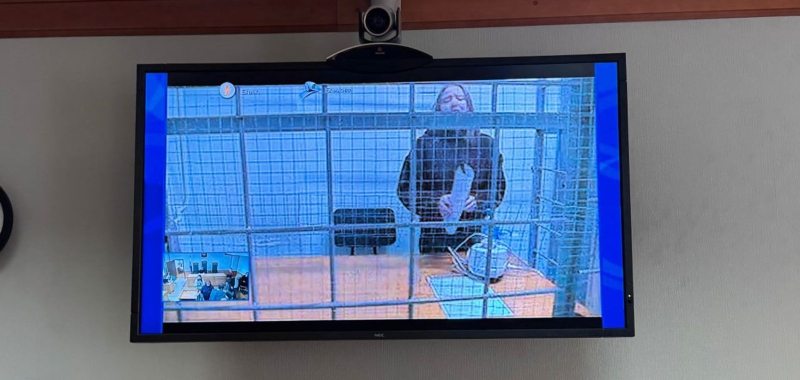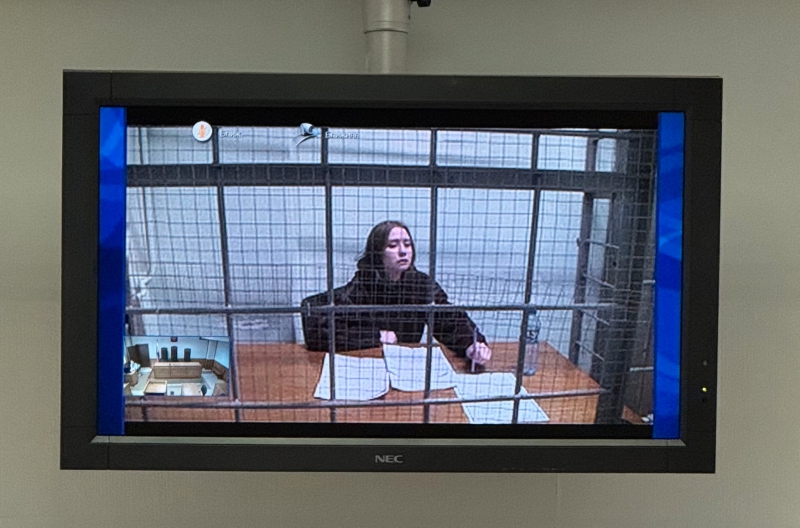Evgenia Lomakova attending a court hearing via video link
On Oct. 16, the Moscow City Court upheld a six-year prison sentence against 20-year-old Yevgenia Lomakova, who was previously convicted of attempting to distribute narcotics. Lomakova suffers from cystic fibrosis, a life-threatening genetic disease that affects the respiratory and endocrine systems and is included on the Russian government’s official list of illnesses that prohibit pretrial detention and imprisonment — making both the Oct. 16 ruling and her sentence, issued in June of this year, unlawful.
According to The Insider’s correspondent, who was present in the courtroom, the court left the original verdict unchanged and rejected the appeals from the defense. Lomakova’s lawyers now plan to challenge the ruling in a cassation court.
Lomakova herself joined the hearing via video link from a pretrial detention center, where she has been held since she was sentenced in June. During the session, she delivered a final statement. It is available in full below:
“Honorable judges,
I want to draw your attention to the fact that I have had a permanent disability since childhood. I don’t need to have it re-certified, because my disease is chronic and incurable. It can only be managed for a while, to slightly delay death. The end is always the same — a painful death. It happens like this: the lungs gradually stop functioning, and I start suffocating, choking on pus-filled mucus.
To delay that moment and live a bit longer, I take pills to support my liver and kidneys, because these organs suffer the most from the large number of medications I must take. I use a stationary inhaler at least three times a day, undergo intravenous therapy with antibiotics, mucolytics, and bronchodilators, and do breathing exercises to help the mucus clear at least a little.
I haven’t talked about this before, but even now, when I leave my cell for court, since I’ll be gone for several hours, I have to take my inhaler with me, because at any moment I might start suffocating. This is what it looks like (shows it): a mask, a cord — and without it, I simply cannot exist.
Russian law explicitly prohibits the pretrial detention and imprisonment of people with cystic fibrosis.

The detention center staff know this; they come to check on me regularly. Every day I receive IV drips in the medical unit to slow down the deterioration. I am monitored by the Cystic Fibrosis Center at the Federal Pulmonology Research Institute, yet my condition still gets worse. I have shortness of breath when I walk, though sometimes I feel slightly better. I no longer receive the targeted therapy for cystic fibrosis; I mentioned this at the previous hearing.
That medication costs about 1.5 million rubles (around $16,000) per month. After I turned 20, the ‘Circle of Kindness’ Foundation stopped providing it because of age restrictions. Until I was 19, they supplied it; now there is no such opportunity. At the moment, I’m without that treatment, and my health is worsening. All my medical records state that I must take this medicine continuously.
On the train to the penal colony, I won’t be able to perform the necessary procedures to stay alive. There won’t be an outlet to plug in my inhaler, and I won’t have my medicines — the convoy officers will confiscate everything, as required by regulations. Most likely, I’ll have to travel with people who smoke, which is dangerous for me.
Right now, I’m in a completely non-smoking cell; the detention center provided this condition so I wouldn’t get worse. My inhalation medicines must also be kept cold. In the heat, they’ll spoil and become unusable. Naturally, on the train, no one will be able to provide these conditions; the medicines will spoil and have to be thrown away because they’d be unsafe to use.
I can’t imagine how I’ll carry all my bags — from the holding area to the vehicle, to the train, I’ll have to move everything myself. Of course, I’ll have at least two bags: with medicines, personal belongings, and the inhaler. No one will be able to help me, and with my lungs, I simply won’t manage. But I’ll have to somehow do it. Honestly, all these thoughts make me feel that it would be easier to go back to my cell and cut my veins — and that would be the end of it. Because I think a quick death is better than a slow and torturous one.
I am not afraid of punishment. No. I am afraid of losing my life at such a young age. I’ve known all my conscious life that I could die by 20 or 30, but I don’t want it to happen under these circumstances.
I did sell drugs until October 2024, but then I stopped. Not because I wanted to buy an expensive car or fancy gadgets, but because I didn’t want to be a burden to my family. I wanted to help my mother, who had a stroke in 2023 and was paralyzed. That’s documented in my case file — her condition and the fact that she was in intensive care.
At that time, I was in my final year of college, working on my thesis and preparing for exams. I also learned that I would only receive expensive treatment until I turned 19. I knew that without it, I wouldn’t survive. In our chat for people with cystic fibrosis, one or two people die every year just because they can’t get this therapy. They go to court, but it takes years. Some die at 22, some at 25. And I understand that it will happen to me too. (cries)
That’s why I sold drugs. It was morally hard because I know what drugs do to people. I’ve seen videos of addicts rotting alive, becoming disabled, unable to live normally. I’m already limited by my illness and by addiction, and I feel it every day. I don’t want to be complicit in someone else’s death or suffering. I started using drugs myself because it was impossible to cope with everything — my illness, my mother’s stroke (cries)… I know it happened partly because of me. My mother spent her whole life trying to protect my health and keep me alive as long as possible. I know it’s my fault.
I feel like I will never have peace in my life. And, honorable court, I am begging you to give me a suspended sentence due to my illness, even if it’s for 10 or 15 years. Because I want to live…
I am ready to report to the probation office every day, to be under strict supervision, just to stay alive.
I am asking you to please consider giving me a chance to live.
If a suspended sentence is impossible, I ask at least for a one-year reprieve — to fill that year with good memories, to spend time with my loved ones (cries) — and that’s all. I am deeply ashamed that after everything my mother has done for me, she now has to see me here… All her suffering has been in vain.
I am asking you to grant me at least a one-year reprieve. Thank you. (cries)”
Lomakova was arrested in December 2024 after police found 27 grams of mephedrone, a scale, and packaging materials in her home. Investigators charged her with attempted drug distribution. Lomakova maintained that she had quit selling drugs before her arrest and was keeping the remaining substance at home. She was found guilty.
The verdict was announced on June 25. Lomakova was taken in handcuffs from the courtroom to Moscow’s Pretrial Detention Center (SIZO) No. 6, which refused to admit her due to her condition and sent her to the medical unit at the Matrosskaya Tishina detention facility. According to her relatives, she did not receive proper treatment there. Between June 25 and Aug. 7, 2025, her lung function dropped from 69% to 32% (with 80% being the normal level).
Her defense team and relatives argued that she should have been charged under a lesser article for possession without intent to distribute (Article 228, Part 2 of the Russian Criminal Code), since investigators failed to prove intent to sell. They requested a suspended sentence in their appeal.
Under Russian government regulations, defendants with cystic fibrosis are not allowed to be held in pretrial detention or sentenced to prison. The list of such medical conditions also includes severe forms of diabetes, Cushing’s syndrome, hyperthyroidism, and other serious illnesses. According to the law, individuals with these diagnoses must be released or placed under house arrest. In Lomakova’s case, both the court and the Federal Penitentiary Service ignored these legal requirements.
Russian law explicitly prohibits the pretrial detention and imprisonment of people with cystic fibrosis.

